纽约大学公开课 美国文学
Lectures on American Literature——美国文学讲义

True Relation of Virginia (1608)
Description of New England (1616)
General History of Virginia, New England, and the Summer Isles (1624)
我要讴歌基督教创造的 奇迹为逃避欧洲的腐败 堕落,他们来到美洲的 海滩;……感谢上帝的 庇佑,把印第安人的荒 芜之地变得辉煌灿烂。 ---科顿· 马瑟
我们将成为整个世界的山巅 城 ( a city set upon a hill ), 全世界人民的眼睛都将看着 我们。如果我们在实现这一 事业的过程中欺骗了上帝, 如果上帝不再像今天那样帮 助我们,那么我们终将成为 世人的笑柄。
A Puritan Should Be…
务实的理想主义者
教条机会主义者
• “a visionary梦想家 who never forget that two plus two equals four; He was a practical idealist…his conduct was regulated by expediency 私利. He was a doctrinaire教条主义者 and an opportunist.”
• In content
religious writings serving either God or colonial expansion
• In form
imitating English literary tradition
American colonial literature is neither real literature nor American
美国文学概述

任何由书写所固定下来的 任何话语。
文本和段落的区别在于, 文本构成了一个相对封闭、 自足的系统。
03
05
02
04
06
由语言文字组成的文学实 体,代指\"作品\",相对 于作者、世界构成一个独 立、自足的系统。
对语言学家来说,文本指 的是作品的可见可感的表 层结构,是一系列语句串 联而成的连贯序列。
文学作品创作和受众所处的文化 和社会环境的总和
整个历史阶段的总和 一个历史 时期的艺术形式
人性的
通过所有的个体不同的期待视野 的集合发生作用的
WHAT IS
文化模型
03
新马克思主义思想
家Raymond
Williams
02
文化竞技(法国)
01
文化就是变化 文化
模型必须是动态的
Marxism&Literature1977
新批判主义new criticism的一部分
新批评是英美现代文学批评中最有影响的流派之 一。它认为文学作品是一个由不同要素组成的、 不断变化运动的自足的体系,文学的规律就在这一 文学本体中。在此基础上,新批评提出了意图谬误 和感受谬误,认为文学批评的有效程序应当是详尽 而又精确地分析一部作品内部各要素的复杂的组 合方式以及它们的相互关系,即细读法。应用新批 评的理论和方法分析文学作品有利于加深人们对 作品的理解和提高人们的鉴赏能力。
美国文学American literature
演讲人
2020-12-30
目录
纽约大学的美国文学课程涵盖了从殖 民时期一直到南北战争时期的美国文 学。我们的目标 WHAT IS
01
纽约大学的美国文学课程涵盖了从殖民 时期一直到南北战争时期的美国文学。 我们的目标
“美国文学”课程教学大纲

“美国文学”课程教学大纲一、课程基本信息开课单位:翻译学院课程名称:美国文学课程编号:223114英文名称:American1iterature课程类型:专业拓展课总学时:36 理论学时:36实验学时:O学分:2分开设专业:翻译专业先修课程:英国文学二、课程任务目标(一)课程任务《美国文学》是翻译专业本科学生的必修课程,是为培养和检验学生美国文学的基本理论知识和理解、鉴赏美国文学原著的能力而设置的一门专业理论课程。
(二)课程目标设置本课程旨在使学生对美国文学形成与发展的全貌有一个大概的了解;并通过阅读具有代表性的美国文学作品,理解作品的内容,学会分析作品的艺术特色并努力掌握正确评价文学作品的标准和方法。
由于本课程以作家作品为重点,因此学生要仔细阅读原作。
通过阅读努力提高语言水平,增强对美国文学原著的理解,特别是对作品中表现的社会生活和人物感情的理解,提高他们阅读文学作品的能力和鉴赏水平。
三、教学内容和要求(-)理论教学的内容及要求本课程主要内容包括美国文学发展史及代表作家的简要介绍和作品选读。
文学史部分从美国历史、语言、文化发展的角度,简要介绍美国文学各个历史断代的主要历史背景,文化,文学思潮与流派等对文学发展的影响,主要作家的文学生涯、创作思想、艺术特色及其代表作品等;选读部分主要节选了美国文学史上各个时期重要作家的代表作品,包括诗歌、戏剧、小说、散文等。
第•章殖民地时期的文学教学内容:了解殖民地时期的社会及文化背景与新英格兰文学的状况,理解清教主义思想及其对美国文学的深远影响。
第一节美国殖民地时期概述一、北美拓殖的开始二、美国清教主义思想三、美国清教主义思想对早期美国文学的影响第二节殖民地时期的代表作家及作品一、安妮•布雷兹特里特(AnneBradStreet)二、爱德华•泰勒(EdwardTay1or)教学重点:殖民地时期新英格兰文学的特点教学难点:清教主义思想第二章理性和革命时期的文学教学内容:了解理性和革命时期美国文学产生的社会及文化背景,掌握理性和革命时期美国文学的形式、特点、代表作家及作品。
《美国文学》课件.ppt

• When he woke up, he noticed that his joints were stiff and that his beard had grown a foot long. Returning to his village, he found it changed almost beyond recognition.
7
3) What does “this legendary superstition” refer to? (Para. 2) 4) What is “the general purport of this legendary superstition”? (Para. 3—Para. 4)
8
5) Is the “Legend of Sleepy Hollow” the story of the Headless Horseman? If not, what does the “Legend of Sleepy Hollow” deal with?
10
Literary Terms: 1.Protagonist: The leading character in a play or story, originally the leader of the CHORUS in the AGON (“contest”) of Greek drama, faced with the ANTAGONIST, the opposition.
9
6) How many major characters are mentioned in the “legend”? Who are they? And what’s the relationship between them? Who is the protagonist? And who is the antagonist?
大学美国文学教案设计模板
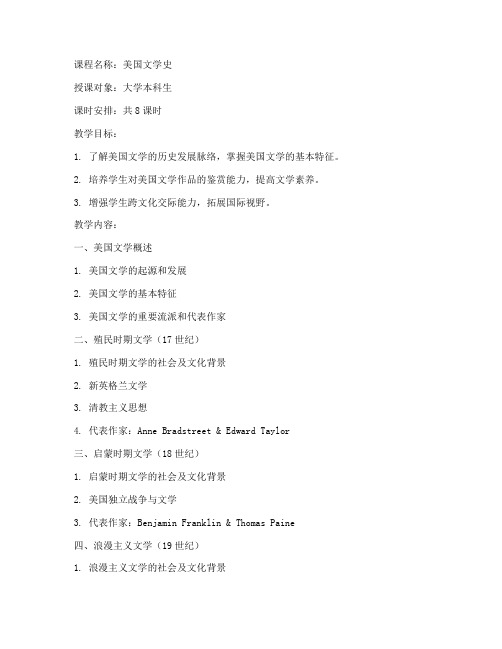
课程名称:美国文学史授课对象:大学本科生课时安排:共8课时教学目标:1. 了解美国文学的历史发展脉络,掌握美国文学的基本特征。
2. 培养学生对美国文学作品的鉴赏能力,提高文学素养。
3. 增强学生跨文化交际能力,拓展国际视野。
教学内容:一、美国文学概述1. 美国文学的起源和发展2. 美国文学的基本特征3. 美国文学的重要流派和代表作家二、殖民时期文学(17世纪)1. 殖民时期文学的社会及文化背景2. 新英格兰文学3. 清教主义思想4. 代表作家:Anne Bradstreet & Edward Taylor三、启蒙时期文学(18世纪)1. 启蒙时期文学的社会及文化背景2. 美国独立战争与文学3. 代表作家:Benjamin Franklin & Thomas Paine四、浪漫主义文学(19世纪)1. 浪漫主义文学的社会及文化背景2. 美国南北战争与文学3. 代表作家:Nathaniel Hawthorne & Edgar Allan Poe五、现实主义文学(19世纪末至20世纪初)1. 现实主义文学的社会及文化背景2. 代表作家:Mark Twain & Henry James六、现代主义文学(20世纪)1. 现代主义文学的社会及文化背景2. 代表作家:F. Scott Fitzgerald & Ernest Hemingway七、后现代主义文学(20世纪后半叶)1. 后现代主义文学的社会及文化背景2. 代表作家:Thomas Pynchon & Don DeLillo八、当代美国文学1. 当代美国文学的社会及文化背景2. 代表作家:Toni Morrison & John Updike教学过程:一、导入1. 结合美国历史背景,简要介绍美国文学的起源和发展。
2. 引导学生关注美国文学的基本特征和重要流派。
二、讲授1. 按照教学内容,依次讲解各个时期的美国文学。
《美国文学》课件song of myself 1
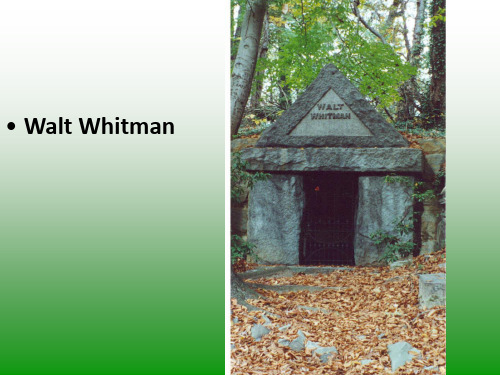
of nature and the universe.
Beat! Beat! Drums!
• Beat! Beat! Drums! Blow! Bugles! Blow! Through the windows---through doors---burst like a ruthless force, Into the solemn church, and scatter the congregation, Into the school where the scholar is studying; Leave not the bridegroom quiet---no happiness must he have now with his bride. Nor the peaceful farmer any peace, ploughing his field or gathering his grain, So fierce you whirr and pound you drums---so shrill your bugles blow.
• 信条和学派暂时不论, 且后退一步,明了它们 当前的情况已足,但也 决不是忘记,
不论我从善从恶,我允 许随意发表意见,
顺乎自然,保持原始的 活力。
An analysis of Song of myself
Three important themes : ➢ the idea of the self ; ➢ the identification of the self with other
Beat! Beat! Drums!
《美国文学》教学课件 American Romanticism

Gothic novel
Gothic novel emphasizes the grotesque mysterious and desolate. It is an ancestor of the modern mystery story , fantasy, and science fiction.
Ideology: Nationalism Patriotism Optimism Puritanism
Foreign influences
Sir Walter Scott,
with his border tales, helped toward the development of American Indian romance and the romantic description of landscape in America literature. ( Cooper )
-----William Wordsworth
2. The Characteristics of American Romanticism.
1) .Early American romantics often modeled their writing on Europe works.
2). The subjects of American Romantic authors were often national ideals of individualism ,democracy ,history and frontier life of the new nation.
--- Robert Burns
I wandered lonely as a cloud
《美国文学》课件二十二
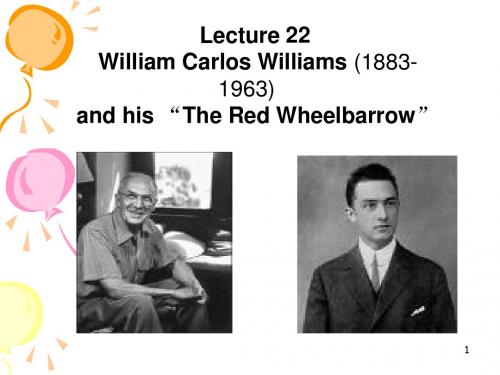
1
His position in American literature
Williams is one of the two major literary figures in modern American literary history for whom writing poetry was only an avocation (the other one being Wallace Stevens); he worked all his life as a physician in America except for two brief visits to Europe.
8
Questions: “The Red Wheelbarrow” 1. What does the author describe? 2. How many images are so much depends contained in the poem? What kind upon of images are they? Which is the a red wheel dominant image? What can these images symbolize? barrow 3. What is the central thought of glazed with rain the poem? water 4. What can the phrase “so besides the white much” mean? chickens 5. Is there anything special about the form of the poem?
美国文学教案(1)American Literature
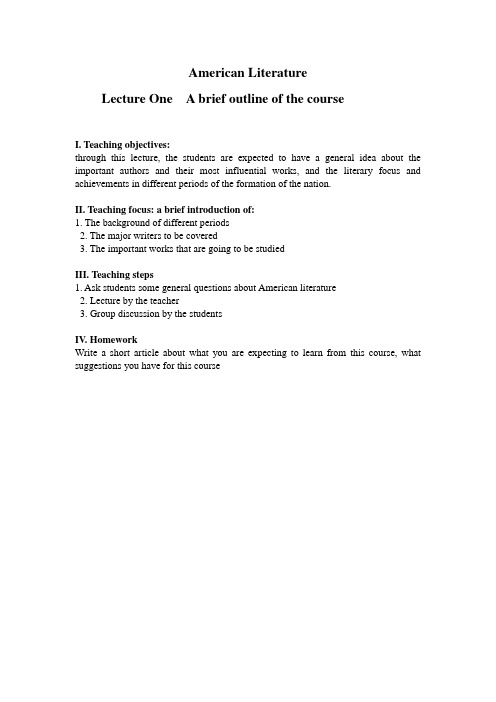
American LiteratureLecture One A brief outline of the courseI. Teaching objectives:through this lecture, the students are expected to have a general idea about the important authors and their most influential works, and the literary focus and achievements in different periods of the formation of the nation.II. Teaching focus: a brief introduction of:1. The background of different periods2. The major writers to be covered3. The important works that are going to be studiedIII. Teaching steps1. Ask students some general questions about American literature2. Lecture by the teacher3. Group discussion by the studentsIV. HomeworkWrite a short article about what you are expecting to learn from this course, what suggestions you have for this courseLecture Two Colonial PeriodI. Teaching objectives:through this lecture, the students are expected to have a general idea about the mission of the first group of Puritan immigrants to the New World, their perseverance in seeking their purpose, and the pervading spirit of Puritanism in the early communities.I.Teaching focus1. The mission of the Puritan immigrants to the New World2. Puritanism and its influence in all spheres of life in the early communities3. The religious poems by Anne BradstreetII.Teaching steps1.Warming-up questions1.1 What is the meaning of Puritan, what are the major characteristics of thePuritans1.2 Why did some Puritans left their own country and risked their lives tocross over the Atlantic Ocean and settle on the New World?1. 3 What is the meaning of theocracy?2.Points to be covered by the teacher2.1 A brief introduction about the Puritan from a historic perspective2.2 The missions of the first group of Puritans to the new world2.3 The situation in the communities of the early settlement2.4 The spirit of Puritanism and its impact on the building of the nation andpeople’s daily life during the colonial period.3.Read and analyze the poem “Upon the Burning of Our House” by AnneBradstreetIII.HomeworkRead the e-book: Research Guide to American Literature: Colonial Literature: 1607-1776Lecture Three: Edwards and FranklinI. Teaching objectivesIn this lecture, the students are expected to get some knowledge about the major point of Puritanism and Calvinism, and how Edwards and Franklin demonstrate different aspects of the spirit of PuritanismII. Teaching focus1. The major doctrine of Puritanism2. The major doctrine of Calvinism3. Benjamin Franklin4. Jonathan EdwardsIII. Teaching steps1. Warming-up questions for the students1.1 Do you know the original of original sin?1.2 Do you have any knowledge about John Calvin and the religious doctrines that he advocated?1.3 Do you know the well-story of Franklin’s flying of kite, and can you name some of his inventions?2. Points to be covered by the teacher2.1 the major doctrines of Puritanism and its profound impact on people’s daily life of the colonial period and literary endeavors for a long time2.2 the major doctrines of Calvinism and its pervading spirit of sin and evil2.3 the most famous self-made man in America, Benjamin Franklin, and his successful story which is the best example of the American Dream from a material perspective.2.4 the pious life of Jonathan Edwards and his influence on a group of writers called the Transcendentalists in the 1830s-40s3. Read and analyze certain passage from Benjamin Franklin’s AutobiographyIV. HomeworkRead the Autobiography of Benjamin Franklin and Sinners in the Hands of an Angry God by Jonathan EdwardsLecture Four American Romantic LiteratureI.Teaching objectivesThrough this lecture, students are expected to have a general idea about the following points: the relationship between American Romantic literature and that of Britain; the major writers and their works of American Romanticism. II.Teaching focus1.The major characteristics of American Romanticism2.Washing Irving and his short stories3.James Fenimore Cooper and his Leatherstocking TalesIII.Teaching steps1. Warming-up questions1.1 Washington Irving is called the Father of American Literature, what canpossibly denote by such honorary title?1.2 There is a very interesting anecdote concerning Cooper’s trying to writenovels by himself, have you ever heard that anecdote, and what is youropinion of such a personage?2. Points to be covered by the teacher2.1 a comparison between Romanticism in America and Britain2.2 Washington Irving’s literary creation and two of his most famouslegendary tales: Rip Van Winkle and Legend of the Sleepy Hollow2.3 Cooper’s Leatherstocking Tales and his importance as the builder of theAmerican myth3. Read and analyze some passages from Rip Van Winkle by WashingtonIrvingIV.HomeworkRead Irving’s Legend of the Sleepy Hollow and Cooper’s The Last MahicanLecture Five American Transcendentalist Literature(1) I.Teaching objectivesThrough this lecture, the students are expected to have a general idea about the following points: the spirit of the period; the major writers and their works. II.Teaching focus1. The sources and doctrines of Transcendentalism2. Emerson’s work and influence during the Transcendental periodIII.Teaching steps1.Points to be covered by the teacher1.1 the various sources of Transcendentalism, such as the idealisticphilosophy of Germany and France, and Oriental mysticism.1.2 the major features of Transcendentalism: Oversoul, importance ofindividual, and nature as symbolic of the Spirit or God.1.3 Emerson’s role in the Transcendentalist movement, the dean, the editor ofthe its major journal Dial, and the founder of the Transcendental club.1.4 Emerson’s Nature and The American Scholar, one is considered to be themanifesto of Transcendentalism, the other is considered to America’s declaration of intellectual independence.2.Read and analyze passages from Nature by Ralph EmersonIV.HomeworkRead TheAmerican Scholar by EmersonLecture Six American Transcendentalist Literature(2) I.Teaching objectivesThrough this lecture, students are expected to have a general idea about the following points: Thoreau and his experience; Thoreau’s masterpiece Walden II.Teaching focus1. Thoreau’s life experience2. Thoreau’s materialization of the doctrines of Transcendentalism in a smallhut on the bank of Walden pond3. The rediscovery and reevaluation of Walden in the twentieth centuryIII.Teaching steps1.Warming-up questionsDo you have any idea about what is Walden about?2.Points to be covered by the teacher2.1 Thoreau’s life style and the commentaries of his contemporaries to him2.2 rediscovery and reevaluation of Thoreau’s Walden in the twentiethcentury2.3 Walden and eco-criticism3. Read and analyze certain passages from WaldenIV.HomeworkRead Thoreau’s WaldenLecture Seven Hawthorne and MelvilleI. Teaching objectivesStudents are expected to learn something about the notorious Salem Witchcraft Trial and the major doctrines of Calvinism and their impacts on Hawthorne and his writings, they are also expected to know Melville’s profession as a sailor and the tremendous influence of his profession as a sailor on almost all his works.II. Teaching focus1.Hawthorne and his Scarlet Letter2.Melville and his Moby DickIII. Teaching steps1 warming up questions1.1 Do you have any knowledge about Moses’ten commandments in the Old Testament, and one of the commandments says that “Thou shaln’t commit adultery”, do you know the meaning of adultery?1.2 Say something about your understanding of alienation2.Points to be covered by the teacher2.1 A rough summary of Salem Witchcraft Trial of 1692 and the role played by one of Hawthorn’s preeminent ancestors2.2 Hawthorne pervading sense of sin and evil and the reflection of these themes in almost all his works, either short stories or novels.2.3 Analysis of the four major characters in The Scarlet Letter2.4 Melville’s experience as a whaler on the sea and its influence on his works2.5 An analysis of his highly symbolic work Moby Dick3. Read and analyze certain passages from The Scarlet LetterIV. HomeworkRead the novel The Scarlet Letter and see the film adapted from this novel, and then make a comparison between themLecture Eight Whitman and DickinsonI. Teaching objectivesStudents are expected to have a general idea about Whitman and Dickinson and the differences between the theme and style of their poems.II. Teaching focus1.Whitman and his Song of Myself2.Dickinson and several of her poemsIII. Teaching steps1.Points to be covered by the teacher1.1 Whitman’s gregarious habit and the democratic tendency reflected in his Leaves of Grass1.2 The different evaluation of Leaves of Grass by Whitman’s contemporaries and critics of the twentieth century.1.3 Dickinson’s reclusive living habit and meditation on death and immortality1.4 Rediscovery and reevaluation of Dickinson’s poems in the twentieth century1.5 Whitman and Dickinson’s influence on American modern poetry2. Read and analyze certain passages from Leaves of Grass and some poems by DickinsonIV. HomeworkTry to write a short poem of Dickinsonian styleLecture Nine American Realist Literature (1)I. Teaching objectivesThrough this lecture, the students are expected to get some knowledge about the American Civil War and its impact on literary creation, and also the major doctrines and focus of American Realist literature.II. Teaching focus1. The American Civil War2. Doctrines and focus of American Realism3. William Dean Howells and his influence on the writings of other writers of thisPeriodIII. Teaching steps1. Warming-up questions2. Lecture by the teacher3. Read and analyze some passages from Criticism and Fiction by William DeanHowellsIV. HomeworkRead American Literary Realism by Barrish, Phillip Cambridge University Press, 2001Lecture Ten American Realist Literature (2)I. Teaching objectivesThrough this lecture, the students are expected to get familiar with the writings and some realist writers such as Henry James and Mark Twain.II. Teaching focus1. Henry James and his The Portrait of a Lady2. Mark Twain and his Adventure of Huckleberry FinnIII. Teaching steps1. Warming-up questions2. Lecture by the teacher3. Read and analyze certain passages from Call of the Wild by Jack LondonIV. HomeworkRead The Ambassadors by Henry James and Life on the Mississippi River by Mark TwainLecture Eleven American Naturalist Literature (1)I.Teaching objectivesThrough this lecture, the students are expected to have a general idea about how Zola’s naturalistic philosophy, Charles Darwin’s evolution theory and the industrialization of the United States brought about the alienation of man with nature, man with man, and man with society, and as a result, the flourish of naturalist literature that reflected these trends.II.Teaching focus1. The social background of naturalist period2. The major features of Naturalism3. The major naturalist writers and their worksIII.Teaching procedures1.Warming-up questions2.Lecture by the teacher3.Group discussion by the studentsIV.HomeworkRead American Naturalism by Bloom HaroldLecture Twelve American Naturalist Literature (2)I. Teaching objectivesThrough this lecture, the students are expected to get familiar with the major naturalistic writers and their representative works.II. Teaching focus1.Stephen Crane and his works2. Theodore Dreiser and his works3. Jack London and his worksIII. Teaching steps1. Warming-up questions2. Lecture by the teacher3. Read and analyze certain passages from Call of the Wild by Jack LondonIV. HomeworkRead The Red Badge of Courage by Crane, American Tragedy by Dreiser, and Martin Eden by Jack LondonLecture Thirteen Literature of the Lost Generation (1)I.Teaching objectivesThrough this lecture, the students are expected to have some knowledge about America’s role during the First World War, and the war’s impact on young people like Fitzgerald and Hemingway, and also the works that reflected the disillusion of the lost generation.II.Teaching focus1. The First World War and the Attitude of American youth toward the war2. The situation in America in the twenties of the 20th century3. Fitzgerald and his nearly autobiographical novelsIII.Teaching steps1.Warming-up questions2.Lecture by the teacher3. Read and analyze certain passages from The Great Gatsby by Fitzgerald IV.HomeworkRead Fitzgerald’s Great Gatsby and This Side of the ParadiseLecture Fourteen Literature of the Lost Generation (2) I.Teaching objectivesThrough this lecture, the students are expected to get some knowledge about the theme and style of the writings of Hemingway.II. Teaching focus1. Hemingway’s personal life2. His works3. His theory of “tip of an iceberg”III. Teaching steps1.Warming-up questions2.Lecture by the teacher3.Group discussion by the studentsIV. HomeworkRead Hemingway’s A Farewell to Arms and The Old Man and the SeaLecture Fifteen American Literature of the SouthI.Teaching objectivesThrough this lecture, the students are expected to have a general idea about the history and current reality of the American South, and the slavery system before the Civil War, and how these combined together affected the general spirit of the southern Americans.II.Teaching focus1. The history of the American South, with slavery system as its focal point2. The situation in the south of America after the civil war3. Faulkner and his fictional world epitomized in his Yoknapatawpha county III.Teaching procedures1.Warming-up questions2.Lecture by the teacher3. Read and analyze certain passages from the Sound and the Fury byFaulknerIV.HomeworkRead Go down, Moses by FaulknerSee the film Gone with the WindLecture Sixteen Post-war American Novel (1)I. Teaching objectivesStudents are expected to have some knowledge about the situation in America after World War II, and the impact and influence of the Cold War, the Vietnam War and McCarthyism on the American people as a whole and American writers as a special group, and the pessimism and skepticism reflected in their works.II. Teaching focus1.The general situation in America after World War II2.J.D.Salinger and his Catcher in the RyeIII. Teaching steps1.Warming up questions1.1 Say something about your knowledge of World War Two1.2 Say something about the Cold War and the Vietnam War2.Points to be covered by the teacher2.1 the impact of World War Two on the consciousness of American intellectuals 2.2 the pessimism reflected in the writings of American writers2.3 the life experience of J.D.Salinger2.4 the one work that makes Salinger immortal (Catcher in the Rye)3. Read and analyze certain passages of Catcher in the RyeIV. HomeworkRead the novel Catcher in the Rye after classLecture Seventeen Post-war American Novel (2)I. Teaching objectivesStudents are expected to have a general idea about the social, political and artistic life in America, and the decline of artistic creation in the traditional style and the emergence of modern and post-modern style which was demonstrated in the absurd, metafiction, and avant-gardism; and students are also expected to have some knowledge about some of the representative writers and their most influential works of this period, such as Kurt V onnegut and his Slaughterhouse- Five, and Joseph Heller and his Catch-22.II. Teaching focus1.Modernism and post-modernism demonstrated in literary works2.Joseph Heller and his Catch-22III. Teaching steps1.Warming up questions1.1 What is modernism? And what is post-modernism1.2 Have you ever heard Catch-22, what does it mean?2.Points to be covered by the teacher2.1 a brief introduction of modernism and post-modernism and their similarities and differences.2.2 a brief introduction of Kurt V onnegut and his Slaughterhouse- Five2.3 a brief introduction of Joseph Heller and his Catch-223.Read and analyze the passages that most represent a Catch-22 situationIV. HomeworkRead Catch-22 after classLecture Eighteen American Multi-ethnic LiteratureI.Teaching objectives1.Through this lecture, the students are expected to have a general idea aboutthe following points: a survey of the situation of American blacks from ahistorical perspective; the images of blacks in the works of whiteAmericanBlack writers and the major theme of their worksII.Teaching focus1. A survey of the situation of American Blacks and other minority peoplefrom a historical perspective2. The images of the minority people like American Indians and the blacks inthe works of white Americans3. Major black writers and other minority group writers and theirrepresentative worksIII.Teaching steps1.Warming-up questions1.1 Do you know anything about the Civil Rights Movement that occurred inthe 1950s-60s in America, and what were the things that minority groups such as the blacks and the American Indians were fighting for:1.2 What is the meaning of invisible, if it is used before man, what does itconnote?2.Points to be covered by the teacher2.1 A general introduction of the Civil Rights Movement in America duringthe 1950s-60s2.2 A general survey of the images of blacks and American Indians in theworks of the whites2.3 A general introduction of the most influential writers of minority groupsand their representative works3. Read and analyze certain passages from the Invisible ManIV.HomeworkRead Ralph Ellison’s Invisible Man。
《美国文学》教学课件Literature of the Eighteenth Century
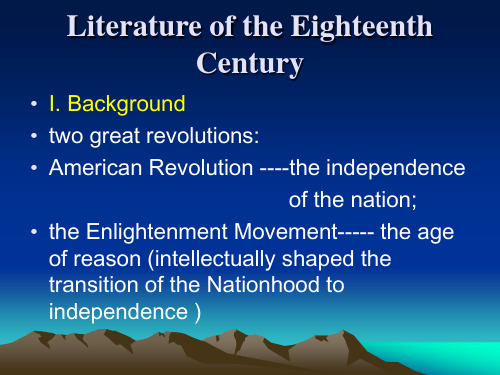
information for the years, the seasons, the sunrise and the sunset, accurate information on tides, as well as information on how to plant certain crops , how to cure hens, etc. all are practical information important to farmers.
The History and the Influence of Enlightenment
2.Newtonian ideas:
a. The universe is seen as a mechanism operating by a rational formula or by unchanging laws available to intelligent humans.
3.The Influence of the Newtonian ideas:
C. Americans believed that more reasonable political and social orders should be established.
D. Americans also learned to take actions to resist oppressive power and to criticize and reform government.
Autobiography
• C. The Autobiography is also an eloquent education of the ideas of the 18th.c. Using his life story as a shining example, Franklin eloquently demonstrated all the major principles of the enlightenment in America.
《美国文学》课件5.ppt
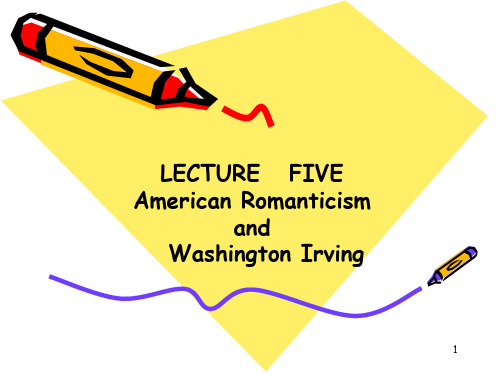
2.Overview of the Age:
1. Belletristic literature-literature as an art-finally emerged in the 19th century. The fifty-year period from 1815 till 1865 saw miraculous achievements in American literature.
LECTURE FIVE American Romanticism
and Washington Irving
1
• 1. American Romanticism
As a movement, romanticism came to America in the 19th century. The Romantic period in American literary history is one of the most important periods in the history of American literature, which stretched from the end of the 18th century through the outbreak of the Civil War.
• Irving, Cooper and Bryant are regarded as pioneers of American Romanticism.
• In exploring r来自manticism, we need to remember that its manifestations varied as widely as the individualistic talents and perspectives of romantic writers.
《美国文学》课件十七
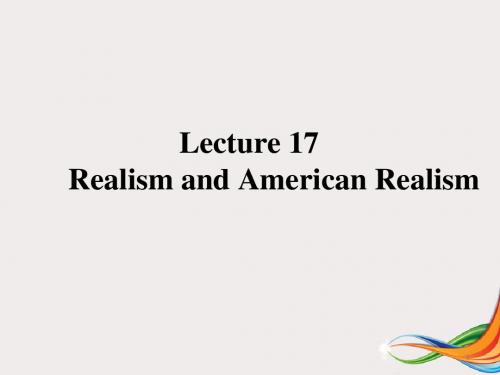
16
3) novellas and short stories: “Daisy Miller” (1879); “The Pupil” (1891); “The Turn of the Screw” (1898); “The Beast in the Jungle” (1903)
17
4) a voluminous and discriminating critic:
views on art: Art must be related to life; it must be life transformed and changed.
18
Views on the novel
The aim of the novel is to represent life: “The only reason for the existence of a novel is that it does attempt to represent life”; he advocates freedom in novel-writing, and inclusion of the disagreeable, the ugly and the commonplace (famous essay, “The Art of Fiction”);
13
3. Henry James (1843-1916)
1) born into a wealthy cultured family of New York; finding the materialistic bent of American life, and its lack of culture and sophistication intolerable, he settled down in England in 1876, and except for some visits to America, spent the rest of his life there, and in 1915 became a naturalized British citizen.
纽约大学公开课 美国文学
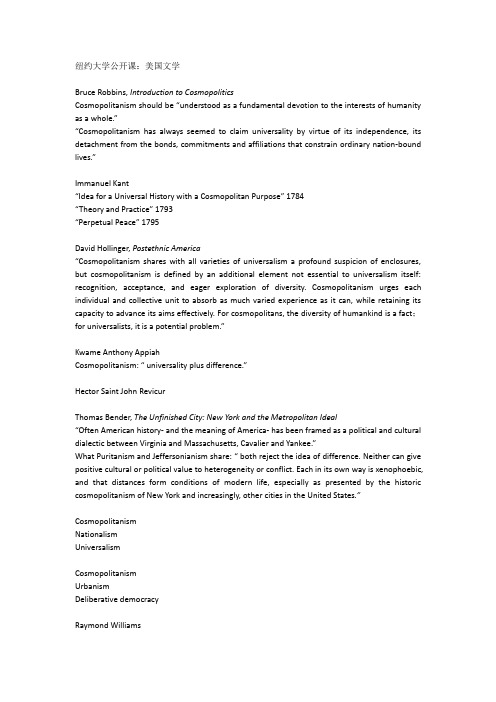
纽约大学公开课:美国文学Bruce Robbins, Introduction to CosmopoliticsCosmopolitanism should be “understood as a fundamental devotion to the interests of humanity as a whole.”“Cosmopolitanism has always seemed to claim universality by virtue of its independence, its detachment from the bonds, commitments and affiliations that constrain ordinary nation-bound lives.”Immanuel Kant“Idea for a Universal History with a Cosmopolitan Purpose” 1784“Theory and Practice” 1793“Perpetual Peace” 1795David Hollinger, Postethnic America“Cosmopolitanism shares with all varieties of universalism a profound suspicion of enclosures, but cosmopolitanism is defined by an additional element not essential to universalism itself: recognition, acceptance, and eager exploration of diversity. Cosmopolitanism urges each individual and collective unit to absorb as much varied experience as it can, while retaining its capacity to advance its aims effectively. For cosmopolitans, the diversity of humankind is a fact;for universalists, it is a potential problem.”Kwame Anthony AppiahCosmopolitanism: “ universality plus difference.”Hector Saint John RevicurThomas Bender, The Unfinished City: New York and the Metropolitan Ideal“Often American history- and the meaning of America- has been framed as a political and cultural dialectic between Virginia and Massachusetts, Cavalier and Yankee.”What Puritanism and Jeffersonianism share: “ both reject the idea of difference. Neither can give positive cultural or political value to heterogeneity or conflict. Each in its own way is xenophoebic, and that distances form conditions of modern life, especially as presented by the historic cosmopolitanism of New York and increasingly, other cities in the United States.”CosmopolitanismNationalismUniversalismCosmopolitanismUrbanismDeliberative democracyRaymond WilliamsMarxism and Literature (1977)DominantResidualEmergentResidual culture consists of those practices that are based on the “residual of ... some previous social and cultural institution or information,” but continue to play a role in the present.Ralph Waldo Emerson (1840)In all my lectures, I have taught one doctrine, namely, the infinitude of the private man. This, the people accept readily enough, & even with loud commendation, as long as I call the lecture, Art; or Politics; or Literature; or the Household; but the moment I call it the Religion--they are shocked, thought it be only be the application of the same truth which they received everywhere else, to a new class of facts.。
lecture_4 美国文学史课件
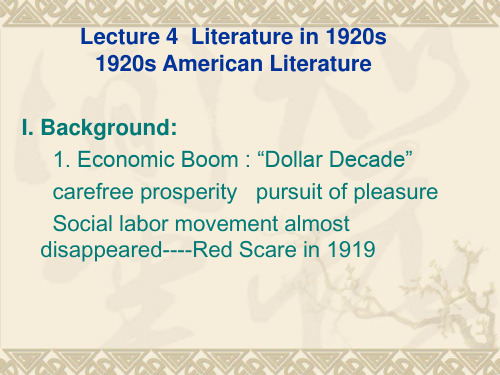
7. Reprentatives: Ezra Pound, William Carlos Williams, Wallace Stevens, T.S. Eliot, Carl Sandburg, Marianne Moore, Hilda Doolittle, Richard Aldington.
Three principles of imagism put forward by Pound: • Direct treatment of thing: • Economy of Expression: • Rhythm:
5. What is an “image” according to Pound:
Fitzgerald: (1896----1940)
• Life: • Works: This Side of Paradise 1920 The Beautiful and Damned 1921 Flappers and Philosophers Tales of the Jazz Ape---- collection of stories
Pound defined an image as that which presents an intellectual and emotional complex in a stage of time. Later he extended this definition as “a vortex or cluster of fused ideas” “endowed with energy”
- 1、下载文档前请自行甄别文档内容的完整性,平台不提供额外的编辑、内容补充、找答案等附加服务。
- 2、"仅部分预览"的文档,不可在线预览部分如存在完整性等问题,可反馈申请退款(可完整预览的文档不适用该条件!)。
- 3、如文档侵犯您的权益,请联系客服反馈,我们会尽快为您处理(人工客服工作时间:9:00-18:30)。
纽约大学公开课:美国文学
Bruce Robbins, Introduction to Cosmopolitics
Cosmopolitanism should be “understood as a fundamental devotion to the interests of humanity as a whole.”
“Cosmopolitanism has always seemed to claim universality by virtue of its independence, its detachment from the bonds, commitments and affiliations that constrain ordinary nation-bound lives.”
Immanuel Kant
“Idea for a Universal History with a Cosmopolitan Purpose” 1784
“Theory and Practice” 1793
“Perpetual Peace” 1795
David Hollinger, Postethnic America
“Cosmopolitanism shares with all varieties of universalism a profound suspicion of enclosures, but cosmopolitanism is defined by an additional element not essential to universalism itself: recognition, acceptance, and eager exploration of diversity. Cosmopolitanism urges each individual and collective unit to absorb as much varied experience as it can, while retaining its capacity to advance its aims effectively. For cosmopolitans, the diversity of humankind is a fact;for universalists, it is a potential problem.”
Kwame Anthony Appiah
Cosmopolitanism: “ universality plus difference.”
Hector Saint John Revicur
Thomas Bender, The Unfinished City: New York and the Metropolitan Ideal
“Often American history- and the meaning of America- has been framed as a political and cultural dialectic between Virginia and Massachusetts, Cavalier and Yankee.”
What Puritanism and Jeffersonianism share: “ both reject the idea of difference. Neither can give positive cultural or political value to heterogeneity or conflict. Each in its own way is xenophoebic, and that distances form conditions of modern life, especially as presented by the historic cosmopolitanism of New York and increasingly, other cities in the United States.”
Cosmopolitanism
Nationalism
Universalism
Cosmopolitanism
Urbanism
Deliberative democracy
Raymond Williams
Marxism and Literature (1977)
Dominant
Residual
Emergent
Residual culture consists of those practices that are based on the “residual of ... some previous social and cultural institution or information,” but continue to play a role in the present.
Ralph Waldo Emerson (1840)
In all my lectures, I have taught one doctrine, namely, the infinitude of the private man. This, the people accept readily enough, & even with loud commendation, as long as I call the lecture, Art; or Politics; or Literature; or the Household; but the moment I call it the Religion--they are shocked, thought it be only be the application of the same truth which they received everywhere else, to a new class of facts.。
